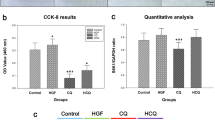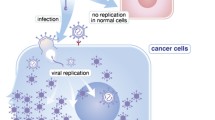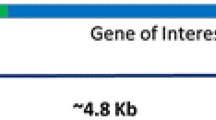Abstract
Background
The thymidine kinase gene of the herpes simplex virus (HSV-tk) is a suicide gene when administrated with the prodrug ganciclovir (GCV). This study investigated the effectiveness of HSV-tk activation as gene therapy for gastroesophageal junction and gastric adenocarcinomas using either the stress-inducible Grp78 promoter or the murine leukemia virus long-terminal repeat (LTR) promoter.
Methods
The HSV-tk gene, controlled by either the Grp78 promoter or the LTR promoter, was transduced into the gastroesophageal junction adenocarcinoma cell line SK-GT-5 and the gastric adenocarcinoma cell line MKN-74. Cell viability after exposure to varying concentrations of GCV was compared. The same cell lines were used to develop a nude mouse model for studies of the HSV-tk/GCV effect in vivo. The effect of intraperitoneal GCV injection on growth of the subcutaneous tumors was measured. HSV-TK expression was measured by Western blot and reverse transcription polymerase chain reaction.
Results
Cell viability in vitro was significantly lower in the HSV-tk expressing (HSV-tk+) cells compared to control (no HSV-tk) cells after exposure to GCV. MKN-74tk+ cells were more sensitive to GCV killing than SK-GT-5tk+ cells. After culture with 1 μg/ml GCV for 10 days, MKN-74/tk cells were totally killed, whereas most SK-GT-5/tk cells survived. Cell viability was significantly lower under glucose starvation conditions when HSV-tk expression was regulated by the Grp78 promoter compared with the LTR promoter. MKN-74 tumors formed with HSV-tk+ cells in nude mice were eliminated after administration of GCV for 3 weeks, but GCV had no effect on tumors formed from HSV-tk− cells. Eradication of tumor formed with Grp78-tk cells was faster than that with LTR-tk cells. HSV-TK protein and mRNA were expressed in the transduced, but not the non-transduced tumors.
Conclusion
HSV-tk xwith ganciclovir suicide gene therapy results in significant cell killing in gastroesophageal junction and gastric adenocarcinoma cells both in vitro and in vivo, but complete tumor elimination only occurred with the gastric adenocarcinoma cell tumors. The most effective approach in this study used the Grp78 promoter in glucose-starvation stress conditions.






Similar content being viewed by others
References
Jemal A, Siegel R, Ward E, et al. Cancer statistics, 2007. CA Cancer J Clin 2007;57(1):43–66. doi:10.3322/canjclin.57.1.43.
Culver KW, Ram Z, Wallbridge S, et al. In vivo gene transfer with retroviral vector-producer cells for treatment of experimental brain tumors. Science 1992;256(5063):1550–1552. doi:10.1126/science.1317968.
Palmer TD, Rosman GJ, Osborne WR, Miller AD. Genetically modified skin fibroblasts persist long after transplantation but gradually inactivate introduced genes. Proc Natl Acad Sci U S A 1991;88(4):1330–1334. doi:10.1073/pnas.88.4.1330.
Dong D, Dubeau L, Bading J, et al. Spontaneous and controllable activation of suicide gene expression driven by the stress-inducible grp78 promoter resulting in eradication of sizable human tumors. Hum Gene Ther 2004;15(6):553–561. doi:10.1089/104303404323142006.
Lee AS. GRP78 induction in cancer: Therapeutic and prognostic implications. Cancer Res 2007;67(8):3496–3499. doi:10.1158/0008-5472.CAN-07-0325.
Roth JA. Gene therapy in thoracic oncology. Ann Thorac Surg 2008;85(5):1837–1838. doi:10.1016/j.athoracsur.2006.09.079.
Shimada H, Matsushita K, Tagawa M. Recent advances in esophageal cancer gene therapy. Ann Thorac Cardiovasc Surg 2008;14(1):3–8.
Sutter AP, Fechner H. Gene therapy for gastric cancer: Is it promising? World J Gastroenterol 2006;12(3):380–387.
Buskens CJ, Marsman WA, Bosma PJ, van Lanschot JJB. The current state of cancer gene therapy and its application in esophageal carcinoma. Dig Surg 2005;22(4):222–233. doi:10.1159/000088052.
Gupta VK, Park JO, Kurihara T, et al. Selective gene expression using a DF3/MUC1 promoter in a human esophageal adenocarcinoma model. Gene Ther 2003;10(3):206–212. doi:10.1038/sj.gt.3301867.
Marsman WA, Buskens CJ, Wesseling JG, et al. Gene therapy for esophageal carcinoma: The use of an explant model to test adenoviral vectors ex vivo. Cancer Gene Ther 2004;11(4):289–296. doi:10.1038/sj.cgt.7700680.
Marsman WA, Wesseling JG, El Bouch A, et al. Adenoviral serotypes in gene therapy for esophageal carcinoma. J Surg Res 2007;140(1):50–54. doi:10.1016/j.jss.2006.12.006.
Heideman DA, Snijders PJ, Craanen ME, et al. Selective gene delivery toward gastric and esophageal adenocarcinoma cells via EpCAM-targeted adenoviral vectors. Cancer Gene Ther 2001;8(5):342–351. doi:10.1038/sj.cgt.7700313.
Buskens CJ, Marsman WA, Wesseling JG, et al. A genetically retargeted adenoviral vector enhances viral transduction in esophageal carcinoma cell lines and primary cultured esophageal resection specimens. Ann Surg 2003;238(6):815–824. doi:10.1097/01.sla.0000098622.47909.c0.
Altorki N, Schwartz GK, Blundell M, et al. Characterization of cell lines established from human gastric-esophageal adenocarcinomas. Biologic phenotype and invasion potential. Cancer 1993;72(3):649–657. doi:10.1002/1097-0142(19930801)72:3<649::AID-CNCR2820720305>3.0.CO;2-L.
Nabeya Y, Loganzo F Jr, Maslak P, et al. The mutational status of p53 protein in gastric and esophageal adenocarcinoma cell lines predicts sensitivity to chemotherapeutic agents. Int J Cancer 1995;64(1):37–46. doi:10.1002/ijc.2910640109.
DuBridge RB, Tang P, Hsia HC, et al. Analysis of mutation in human cells by using an Epstein–Barr virus shuttle system. Mol Cell Biol 1987;7(1):379–387.
Ory DS, Neugeboren BA, Mulligan RC. A stable human-derived packaging cell line for production of high titer retrovirus/vesicular stomatitis virus G pseudotypes. Proc Natl Acad Sci U S A 1996;93(21):11400–11406. doi:10.1073/pnas.93.21.11400.
Chen X, Zhang D, Dennert G, et al. Eradication of murine mammary adenocarcinoma through HSVtk expression directed by the glucose-starvation inducible grp78 promoter. Breast Cancer Res Treat 2000;59(1):81–90. doi:10.1023/A:1006398918227.
Yu H, Eton D, Wang Y, et al. High efficiency in vitro gene transfer into vascular tissues using a pseudotyped retroviral vector without pseudotransduction. Gene Ther 1999;6(11):1876–1883. doi:10.1038/sj.gt.3301019.
Zhou Q, Sherwin RP, Parrish C, et al. Contortrostatin, a dimeric disintegrin from Agkistrodon contortrix contortrix, inhibits breast cancer progression. Breast Cancer Res Treat 2000;61(3):249–260. doi:10.1023/A:1006457903545.
Oberg S, Lord RV, Peters JH, et al. Is adenocarcinoma following esophagoduodenostomy without carcinogen in the rat reflux-induced? J Surg Res 2000;91(2):111–117. doi:10.1006/jsre.2000.5908.
Tang Q, Zhang D, Wan M, Jin L. Experimental study of the RV-HSV-TK/GCV suicide gene therapy system in gastric cancer. Cancer Biother Radiopharm 2007;22(6):755–761. doi:10.1089/cbr.2007.346.
Nakaya H, Ishizu A, Ikeda H, et al. In vitro model of suicide gene therapy for alpha-fetoprotein-producing gastric cancer. Anticancer Res 2003;23(5A):3795–3800.
Zhang JH, Wan MX, Pan BR, Yu B. Cytotoxicity of HSVtk and hrTNF-alpha fusion genes with IRES in treatment of gastric cancer. Cancer Lett 2006;235(2):191–201. doi:10.1016/j.canlet.2004.10.054.
Zhang JH, Wan MX, Pan BR, Yu B. Cytotoxicity of HSVtk and hrTNF-alpha fusion genes with IRES in treatment of gastric cancer. Cancer Biol Ther 2004;3(11):1075–1080.
Matsubara H, Kawamura K, Sugaya M, et al. Differential efficacy of suicide gene therapy by herpes simplex virus-thymidine kinase gene reflects the status of p53 gene in human esophageal cancer cells. Anticancer Res 1999;19(5B):4157–4160.
Shimada H, Matsubara H, Ochiai T. p53 gene therapy for esophageal cancer. J Gastroenterol 2002;37(Suppl 14):87–91.
Craperi D, Vicat JM, Nissou MF, et al. Increased bax expression is associated with cell death induced by ganciclovir in a herpes thymidine kinase gene-expressing glioma cell line. Hum Gene Ther 1999;10(4):679–688. doi:10.1089/10430349950018751.
Fumoto S, Nishi J, Nakamura J, Nishida K. Gene therapy for gastric diseases. Curr Gene Ther 2008;8(3):187–200. doi:10.2174/156652308784746431.
King GD, Curtin JF, Candolfi M, et al. Gene therapy and targeted toxins for glioma. Curr Gene Ther 2005;5(6):535–557. doi:10.2174/156652305774964631.
Nasu Y, Saika T, Ebara S, et al. Suicide gene therapy with adenoviral delivery of HSV-tK gene for patients with local recurrence of prostate cancer after hormonal therapy. Mol Ther 2007;15(4):834–840.
Ayala G, Satoh T, Li R, et al. Biological response determinants in HSV-tk+ ganciclovir gene therapy for prostate cancer. Mol Ther 2006;13(4):716–728. doi:10.1016/j.ymthe.2005.11.022.
Acknowledgment
This study is supported by STOP Cancer Foundation, Los Angeles, Cancer Institute NSW, NSW Cancer Council, and the National Health and Medical Research Council.
Author information
Authors and Affiliations
Corresponding author
Additional information
Armen Azatian and Hong Yu are equal co-first authors.
Rights and permissions
About this article
Cite this article
Azatian, A., Yu, H., Dai, W. et al. Effectiveness of HSV-tk Suicide Gene Therapy Driven by the Grp78 Stress-Inducible Promoter in Esophagogastric Junction and Gastric Adenocarcinomas. J Gastrointest Surg 13, 1044–1051 (2009). https://doi.org/10.1007/s11605-009-0839-1
Received:
Accepted:
Published:
Issue Date:
DOI: https://doi.org/10.1007/s11605-009-0839-1




